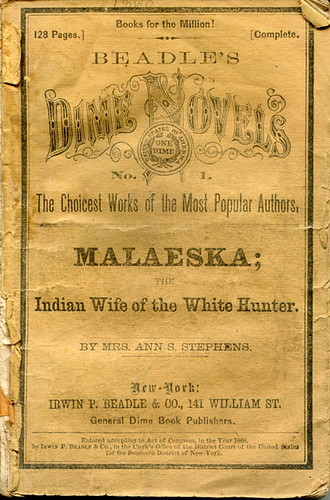
The University of Tulsa’s Department of Special Collections and University Archives would like to announce the acquisition of two new dime novels to our holdings. Dime novels are a staple of American popular culture, and the precursors of today’s mass market paperbacks, comic books, and even television shows and movies based on the dime novel genres. In our mission to be the most effective and efficient research tool we can be for our users, our department holds numerous popular culture related materials. Among our many holdings related to popular culture, our department has an extensive collection of dime novels, including Westerns, religious, adventure, and suspense.
Among many others, our collection has a copy of the first dime novel ever published, Ann S. Stephens’ Malaeska, the Indian Wife of the White Hunter from 1860. The novel was essentially a reprint of Stephens’s earlier serial that appeared in the Ladies’ Companion magazine in February, March and April 1839. It sold more than 65,000 copies within the first few months of its publication as a dime novel. The dime novels varied in size, even within this first Beadle series, but were roughly 6 and 1/2 by 4 and 1/4 inches, with 100 pages. The first 28 were published without a cover illustration, in a salmon colored paper wrapper, but a woodblock print was added with issue 29, and reprints of the first 28 had an illustration added to the cover. Of course, the books were priced at ten cents, hence their name.
Malaeska; the Indian Wife of the White Hunter
Our most recent acquisition consists of two issues of Beadle’s Dime Novels from 1866, James L. Bowen’s The Maid of Wyoming, a Western, and Roger Starbuck’s The Lost Ship, a maritime-themed suspense thriller. Along with the other 4000-plus dime novels in our collection, these valuable pieces capture the beginnings of American popular culture. Although in the modern age “dime novel” has become a term to describe any quickly written, lurid potboiler and as such is generally used as a pejorative to describe a sensationalized yet superficial piece of written work, these books were integral in the early stages of American mass culture.
The University of Tulsa’s Department of Special Collections and University Archives is proud to hold these dime novels, and would like to invite our students, faculty and general public to come and take a look at these pieces of American history.

